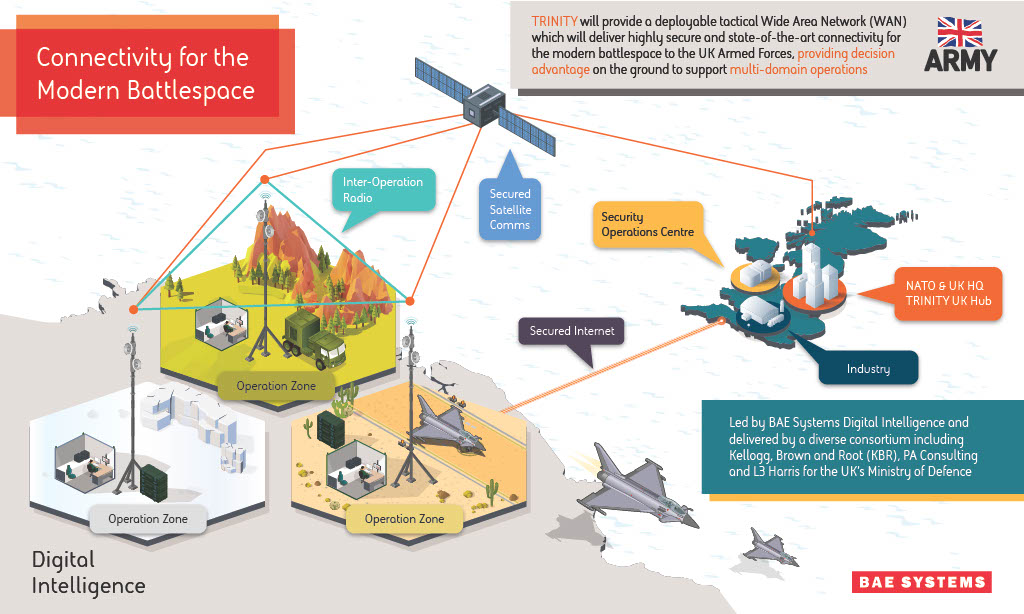BAE gets UK Contract to Boost Battlefield Communications
The Ministry of Defence (MOD) has awarded BAE Systems an £89 million (USD 13 million) contract to enhance UK Armed Forces’ front-line connectivity in a continually evolving, multi-domain battle environment. The contract will boost connectivity for military personnel, linking small reconnaissance drones, combat vehicles, fighter jets, aircraft carriers and military commands.
Modern battles are fought across land, sea, air, space, cyber and electronic warfare. Rapidly evolving technologies mean each domain is highly contested so it is vital that militaries maintain control of their communications in these challenging environments, a company statement said.
The new five-year contract will see BAE Systems lead a consortium of trusted partners, including Kellogg, Brown and Root (KBR), PA Consulting and L3Harris, to design and manufacture a deployable tactical Wide Area Network (WAN) known as “Trinity”. This will deliver a highly-secure and state-of-the-art battlefield internet capability to UK forces which will sustain battlefield awareness and intelligence sharing through a myriad of adversarial attacks.
David Armstrong, Group Managing Director at BAE Systems’ Digital Intelligence business, said: “In an increasingly complex and fast-paced threat landscape, Trinity will empower the UK Armed Forces with a better view of what is happening, enabling them to make swift, informed decisions when and where it matters most. “By providing this advantage to front-line decision makers, Trinity reinforces our commitment to equipping the British military with the right tools to stay ahead in an ever-evolving battlespace.”
BAE Systems will combine its defence communications expertise to develop, deliver and deploy world-leading network capabilities using the full spectrum of communications infrastructure to avoid being solely reliant on satellites or fixed infrastructure which are often targeted by adversaries.
Trinity’s resilience is based on its composition. It is made up of a series of nodes, each able to add, access and move data in a secure network. If a number of nodes are damaged in warfare, the rest automatically re-route to maintain optimum network speed and flow of information, making it highly effective.
Minister for the Armed Forces, James Heappey MP, said: “In this continually evolving, multi-domain environment it is vital that our personnel have access to world-leading communications capabilities while on operations. “We remain committed to working closely with the best of British industry as they support our endeavour to better connect with our allies and their assets in theatre.”
The company statement said Falcon is the operational communications network for the Army and RAF, in simple terms, it is a battlefield internet service. It is due to be retired in 2026. However, Trinity will not replace the local area subsystem or telephony. BAE Systems is the incumbent provider for Falcon.
The £89 million will be dedicated to the research and development phase of the programme, with Trinity due to be delivered from December 2025. There will be the option to extend the contract out to a total of nine years, to cover the development throughout its life and ensure the technical design continues to evolve to meet UK Armed Forces requirements. – bae/adj/mgm (Pix: BAE Systems)


